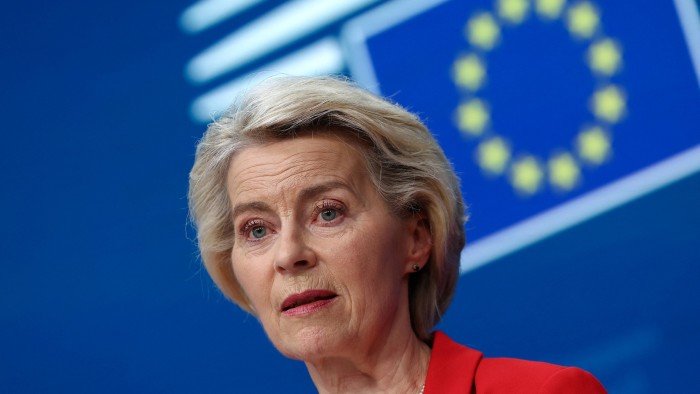
Stay informed with free updates
Simply sign up to the EU trade myFT Digest — delivered directly to your inbox.
A final EU-US trade deal is “impossible” before July 9, so the two sides are aiming for a less detailed “agreement in principle”, European Commission president Ursula von der Leyen said on Thursday ahead of talks in Washington.
The EU and US are edging closer to a tentative agreement following almost three months of negotiations to avert Donald Trump’s threat to impose 50 per cent tariffs on goods from the EU next week.
“It’s a huge task because we have the largest trade volume globally between the EU and the United States, €1.5tn [annually] — very complex and a huge quantity,” she told a press conference.
“What we are aiming at is an agreement in principle,” she added, saying the 90 days that were allowed for talks made “an agreement in detail impossible”.
The UK had also agreed to an agreement in principle with the US, she said. “As far as I am informed there are only two countries so far that have concluded with an agreement in principle.” The US announced a deal with Vietnam on Wednesday.
However, both deals left US “reciprocal” tariffs in place. Vietnam accepted 20 per cent and the UK 10.
EU trade commissioner Maroš Šefčovič is in Washington today for talks to push for a deal before the July 9 deadline, after which Trump has threatened to increase “reciprocal” tariffs to 50 per cent. He will meet US Treasury secretary Scott Bessent, and then jointly commerce secretary Howard Lutnick and trade representative Jamieson Greer.
Lutnick has said that countries without deals will get increased tariffs after July 9.
EU diplomats have told the Financial Times that the bloc will probably accept 10 per cent across-the-board levies but still wanted to get cuts to the sectoral tariffs on products such as steel, at 50 per cent, and vehicles and vehicle parts at 25 per cent.
It was willing to commit to buying more US goods to cut its trade surplus.
Friedrich Merz, the German chancellor, who is under huge pressure from his car industry, repeated his call last week for a swift deal.
“This is not about a finely crafted, comprehensive trade agreement with the USA negotiated down to the last detail,” he said.
“What is at stake here is the rapid resolution of a customs dispute, particularly for our country’s key industries — the chemical industry, the pharmaceutical industry, mechanical engineering, aluminium, steel and the automotive industry . . . We need a quick result now. Better quick and simple than long and complicated, with negotiations dragging on for months.”
The UK secured a quota of 100,000 vehicle exports annually with 10 per cent tariffs. UK exports of jet engines and other aerospace components to the US are also spared from American levies.
It dropped its tariffs on bioethanol just from the US, and increased quotas for US beef imports.
US tariffs cover about €380bn of annual EU trade with the US, equivalent to about 70 per cent of the total.
America is considering extending higher sectoral levies to goods including copper, lumber, aerospace parts, pharmaceuticals, chips and critical minerals, which would cover almost all EU trade.



